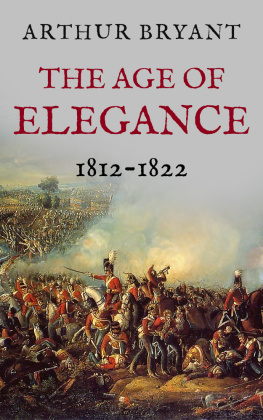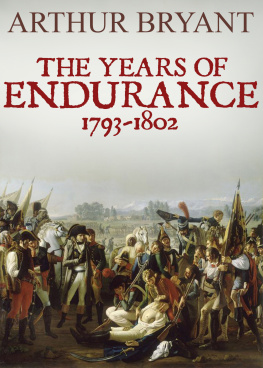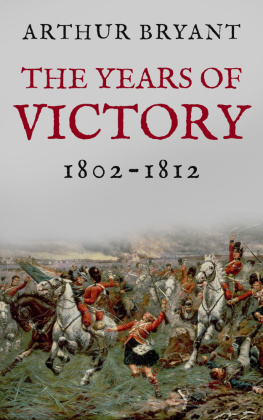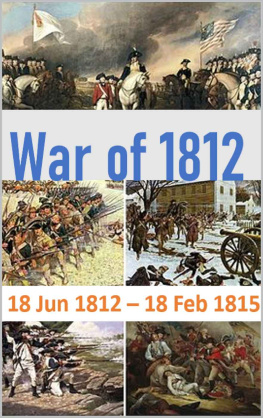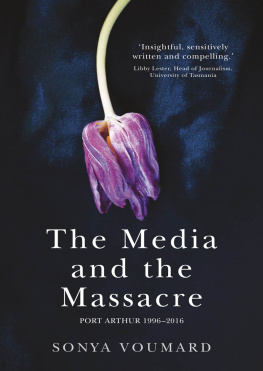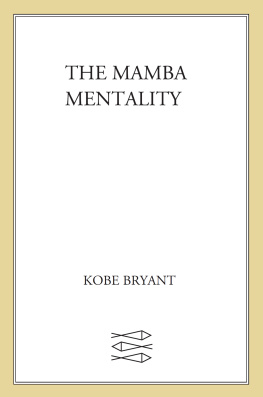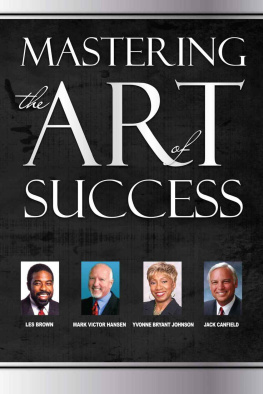The Age of Elegance
1812-1822
Arthur Bryant
Copyright Arthur Bryant 1950
The right of Arthur Bryant to be identified as the author of this work has been asserted by him in accordance with the Copyright, Designs and Patents Act, 1988.
First published in the United Kingdom in 1950 by Collins.
This edition published in 2014 by Endeavour Press Ltd.
To Field-Marshal Montgomery Victor of Alamein
Table of Contents
Preface
IN The Years of Endurance and Years of Victory , I tried to trace the course of our ancestors' long struggle against the French Revolution and Napoleon. The second of these, published in 1944, left the tale unfinished with the capture of Ciudad Rodrigo in January, 1812, and the opening of the offensive which was to carry Wellington's army, first to Madrid and then to the Pyrenees. I have completed my ten years' task by taking the story to its conclusion at Toulouse, the Vienna Conference table, and Waterloo. The war and its termination, so often recorded by Continental writers, has never been presented in its entirety from the British angle by a modern historian, though its different phases have been definitively treated in the great classics of Oman, Fortescue, Holland Rose, Fisher, Corbett, Mahan, and Webster.
Living in a post-war and revolutionary age, I have also tried to describe, in the second and longer part of the book, the impact of the bewildering economic, social, and ideological phenomena of the time on victorious Britain. The seven years that followed the Napoleonic Wars were among the most confused in our history; they appear so to the student because they were so to those who lived through them. Britain, without realizing what was happening, was undergoing a major revolution, one which had been hastened but concealed by her long struggle and splendid victory. The Industrial Revolution and its aftermath have been presented by a succession of great economic and social historians Cunningham, Toynbee, Smart, the Webbs and Hammonds, Halvy, and, more recently, Clapham, Cole, Fay, and Ashton. The political and literary society it both supported and undermined has been brilliantly reconstructed in the work of such distinguished living scholars and critics as Professor Aspinall, Sir Herbert Grierson, Edmund Blunden, Lord David Cecil, Roger Fulford, John Gore, Harold Nicolson, Peter Quennell, and Professor Willey. What I have attempted, however inadequately, is to show the synthesis between the two: to depict on a single canvas the nation's wealth and splendour, its tough, racy, independent, rustic and sporting life, its underlying poverty and degradation, and the clash between its ancient faith and polity and its newer needs and aspirations. In this I have been immeasurably assisted by Professor Woodward's Age of Reform , and the earlier and monumental work of Elie Halvy.
It remains to thank those who have helped me so generously: my constant guide and critic, Milton Waldman, and my patient amanuenses, my wife and secretaries; Colonel Alfred Burne who, as before, has helped me with the maps and military history; Commander John Owen, H. J. Massingham, Ludovic Kennedy, Bernard Knowles, General Sir Bernard Paget, and Colonel Sir James Neville, who have all read the book in part or in whole and have made invaluable suggestions for its improvement. I am particularly indebted to Henry Newnham and Herbert van Thal who again have read my proofs, to Professor L. B. Namier who, in the midst of his own work has placed at my disposal his immense historical knowledge and wisdom, and to Professor A. Aspinall who has given me the benefit of his unrivalled knowledge of the period and helped to eliminate many errors. I must also record my gratitude to Lord Hamilton of Dalzell, for allowing me the use of his ancestor's manuscript, referred to in these pages as the Hamilton of Dalzell MS. , to Lady Gurney of Walsingham Abbey for so kindly sending for my inspection Robert Blake's MS. diary, to Brigadier C. E. Hudson, V.C., and General Sir Henry Jackson for the use of unpublished Waterloo letters, and to the Duke of Wellington for generous permission to use extracts from Mrs Arbuthnot's Journal which he and my kind friend, Francis Bamford, have edited.
Arthur Bryant,
Smedmore,
July, 1950
Chapter One England Takes the Offensive
And what are noble deeds but noble truths realised?
- Coleridge
IN the spring of 1812 every road across Germany was thronged with horses, guns, and wagons bound for Poland. The ditches were strewn with dead horses, farms were stripped of livestock, villages requisitioned and looted. A British prisoner in a fortress on the frontiers of France watched for weeks the interminable train of men, horses and supplies, until the refrain of his jubilant jailers grew intolerable: The Emperor will soon subdue England. More than half a million troops were marching east. Their aim was to drive back Russia into her Asian steppes and open a way to world empire.
The Grande Arme was the most concentrated instrument of power yet seen on earth. It surpassed the armies of Alexander and Caesar, of Darius, Attila, and Tamerlane. The restless energy of the Revolution, superimposed on the martial tradition of France, had been forged by the organizing genius of Napoleon into an irresistible weapon. The names of Lodi, Marengo, Austerlitz, Jena, Friedland, and Wagram were inscribed on its banners; in fourteen years it had entered every Continental capital except St Petersburg, Stockholm, and Constantinople.
Yet there remained one force it had been unable to subdue. The sea, and the floating batteries of England that barred the seas channels, had set bounds to its conquests. And neither threats nor guile could induce the island rulers to make peace. True to the beaconlight of their dead leader, Pitt, they had refused to accept the universal hegemony which was Napoleons prescription for human government. The will and genius of the crowned Jacobin was matched by the stubborn refusal of British aristocrats, squires, traders, and lawyers to accept his dictatorship. And for all the strains and injustices of British social life, that refusal so far as they had any say in the matter was endorsed by the common people of Britain. The rude Wapping boatmen who sailed with Nelson and Collingwood, the hungry North Country weavers who enlisted for liquor to drown the memory of their ill-usage and cares, the Irish peasants who fought so valiantly by their side, had stood, for a generation, between Napoleons armies and the domination of the world. As the spring of 1812 crept northwards over a cowed Europe, they stood there still.
It was Englands mysterious art of commanding the waves that now impelled those armies eastwards. Westwards they could not go: four great sea-battles fought during the past fifteen years off Europes shores had made that plain, even to Napoleon. On their own element the English were invincible. Nor was their power confined to the Atlantic. Southwards, too, in Europes inland sea, their invisible ring extended. Twice Napoleon had tried to break it: once when, taking advantage of their Fleets absence from the Mediterranean, he had seized Malta and landed in Egypt; again when he had treacherously invaded the territories of his ally, Spain, with the intention of closing the Straits of Gibraltar. In each case the logic of sea-power and its stranglehold on military communications had thwarted him. Striking back from the sea at the point where his own lunge was over-extended, a handful of stiff, red-coated British soldiers had landed from their ships and called on the conquered to rise. Ten years before, Napoleon had wheedled them out of Egypt by a truce. Yet when, in an attempt to renew his drive on Asia and Africa, he had broken that peace, their fleets had closed round him again. And since their landing in Portugal, all his Marshals attempts to expel them from that seabound extremity of Europe had been in vain. After four years they were still there and, because of their presence, his brothers Spanish subjects were in a state of permanent eruption.

